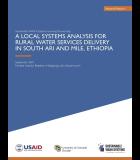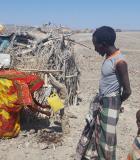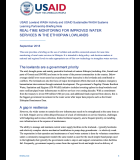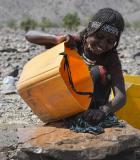In the harsh, arid lowlands of Ethiopia, USAID is working with the government to accelerate progress on its One WASH National Program to increase access to basic water services to 83 percent of its population. In the mostly pastoral communities where the USAID Lowland WASH Activity is based, water sources are few and far between, and even when available, those sources may not be functioning or dispensing safe water. In two of the activity’s three focal regions, Afar and Somali, mechanized boreholes serve as the predominant water schemes. These motorized water points benefit large numbers of communities, so a system failure affects a lot of people.
This is where Lowland WASH’s innovative approach to water system functionality comes into play. With the help of private-sector partner SweetSense, 107 sensors have been installed so far in Afar region of the lowlands to conduct real-time data monitoring of each water scheme’s operations. These sensors transmit a daily data flow signal via cell phone or satellites (in the case of more remote settings) to a central cloud-based remote dashboard. This system maps where the problems are to help the water bureau plan and prioritize its maintenance responses. Maintenance requests are tracked through a ticket system and tasks assigned to the operations and maintenance department and relevant staff or crew. By the end of 2018, 100 percent of the mechanized water points will be monitored using the unique sensors and tracked using a data visualization platform, which is connected to the regional water bureau’s management information system. “These sensors will help us significantly by improving timeliness of our maintenance responses,” says Ahmed Sultan, deputy head of the Afar Regional Water Bureau.
In addition to enabling decision-makers at the regional and district level to improve accountability, the system can serve as a powerful advocacy tool to address additional equipment, manpower, and resource needs. Says Lowland WASH Director Petros Birhane, “Lowland WASH might not be able to address all the gaps from this process, but the findings will be owned by the regional governments and shared with other partners to improve the whole process because the gap is huge.”
Related
Mobile Communities in Ethiopia Seek Fixed Solutions to Their Water and Sanitation Challenges





